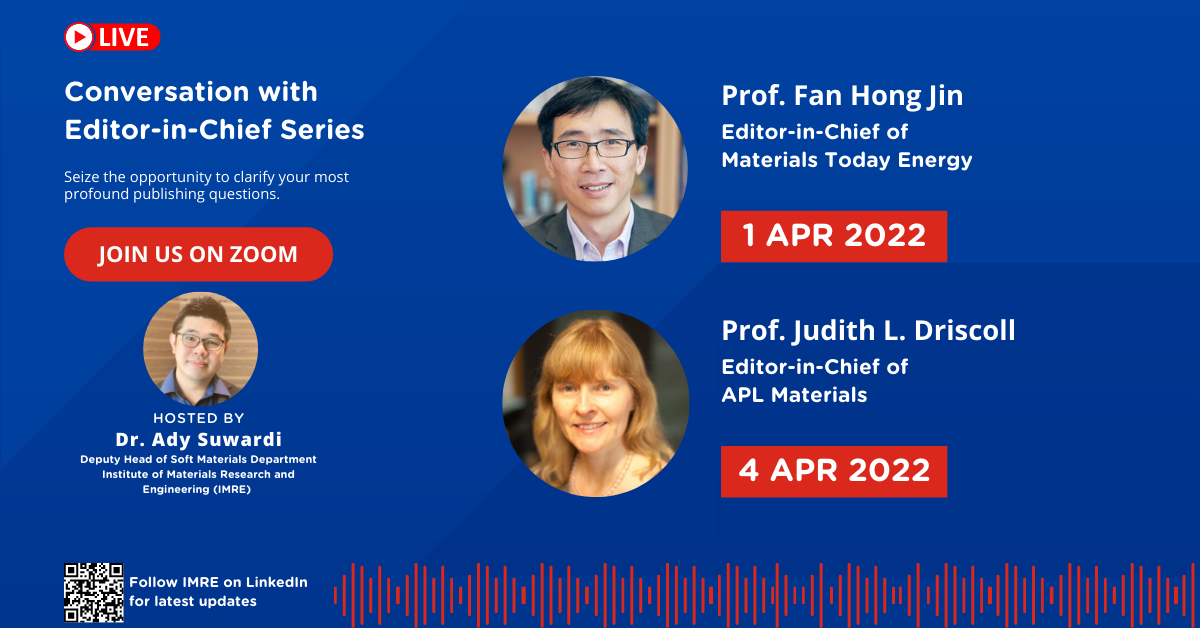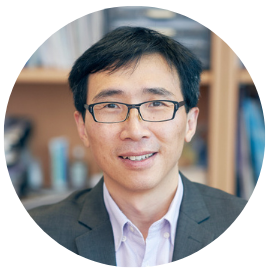Conversation with Editor-in-Chief Series
In this webinar, IMRE invites Editors-in-Chief from prestigious journals to share tips and tricks of writing successful research articles for publications.

Date
Speakers
1 April 2022
4 pm to 5 pm
(SG Time)

Prof. Fan Hong Jin
Editor-in-Chief of Materials Today Energy
Biography
Dr. Fan Hong Jin is professor at Nanyang Technological University. He is working on advanced materials for new energy, including electrocatalysis and batteries. Prof. Fan has been recognised as "Highly Cited Researcher" consecutively since 2016 by Clarivate Analytics. He is currently the Editor-in-Chief of Materials Today Energy. Prof. Fan received his PhD degree from National University of Singapore in 2003, followed by postdoc at Max-Planck-Institute of Microstructure Physics, Germany and the University of Cambridge. He joined in NTU as faculty since 2008. Prof. Fan’s recent research is focused on nanomaterials in energy conversion and storage, including batteries and electrocatalysts. He has published 250+ journal articles, with citations of nearly 30,000 times with an H-index of 86.
About the Journal
Materials Today Energy is a multi-disciplinary, rapid-publication journal focused on all aspects of materials for energy.
Materials science continues to play a vital part in the development of energy technologies spanning generation, storage, conversion, distribution and policy. Materials Today Energy provides a forum for the discussion of high quality research that is helping define the inclusive, growing field of energy materials.
Part of the Materials Today family, Materials Today Energy offers authors rigorous peer review, rapid decisions, and high visibility. The editors welcome comprehensive articles, short communications and reviews on both theoretical and experimental work in relation to energy harvesting, conversion, storage and distribution, on topics including but not limited to:
- Solar energy conversion
- Hydrogen generation
- Photocatalysis
- Thermoelectric materials and devices
- Materials for nuclear energy applications
- Materials for Energy Storage
- Environment protection
- Sustainable and green materials
4 April 2022
5 pm to 6 pm
(SG Time)

Prof. Judith Driscoll
Editor-in-Chief of APL Materials
Biography
Judith MacManus-Driscoll is a professor of materials science in the Department of Materials Science and Metallurgy at the University of Cambridge (UK). Her research focuses on the properties of complex oxide materials and nanostructures with wide-ranging functions. During the last 20 years of her career, she has published more than 400 papers in this area. She is a Fellow of the American Physical Society, the Institute of Physics (UK), the Royal Academy of Engineering, and the Materials Research Society, and a visiting scientist at Los Alamos National Laboratory.
About the Journal
APL Materials features original, experimental research on significant topical issues within the field of materials science. In order to highlight research at the forefront of materials science, emphasis is given to the quality and timeliness of the work. The journal considers theory or calculation when the work is particularly timely and relevant to applications.
In addition to regular articles, the journal also publishes Special Topics, which report on cutting-edge areas in materials science, such as Topological Semimetals, Open Framework Materials, and Materials in Neuromorphic Computing.
Topic areas include:
- Nanostructures, nanocomposites, nanomaterials, and low-dimensional materials
- Materials for energy harvesting, storage, and generation
- Optical and photonic materials
- Electronic, magnetic, spintronic, quantum, and superconducting materials
- Ferroic and multiferroic materials
- Semiconductors and nitride materials
- Metamaterials
- Catalytic materials
- Porous and framework materials
- Functional materials
- Bioinspired and biological materials, including tissue engineering and drug delivery
- Colloids and polymers
- Surfaces, interfaces, and thin films
- First-principles calculations coupled to experimental results
- Advanced materials characterization
Stay tuned for more information on the speakers lined up.
Past Webinars
Conversation with Editor-in-Chief | 2022 February
Conversation with Editor-in-Chief | 2022 January
Conversation with Editor-in-Chief | 2021
A*STAR celebrates International Women's Day

From groundbreaking discoveries to cutting-edge research, our researchers are empowering the next generation of female science, technology, engineering and mathematics (STEM) leaders.
Get inspired by our #WomeninSTEM
.png?sfvrsn=b59474e9_3)